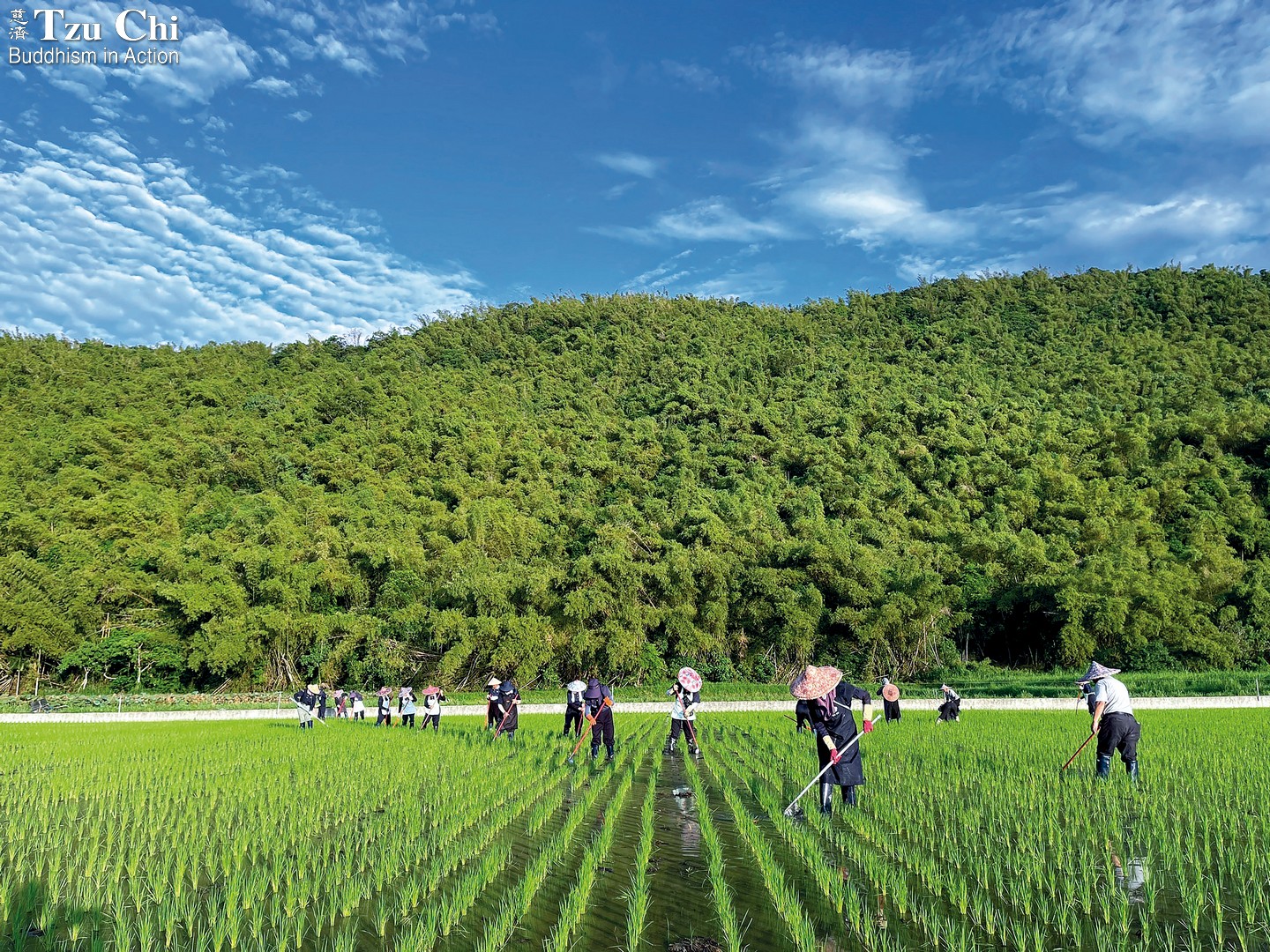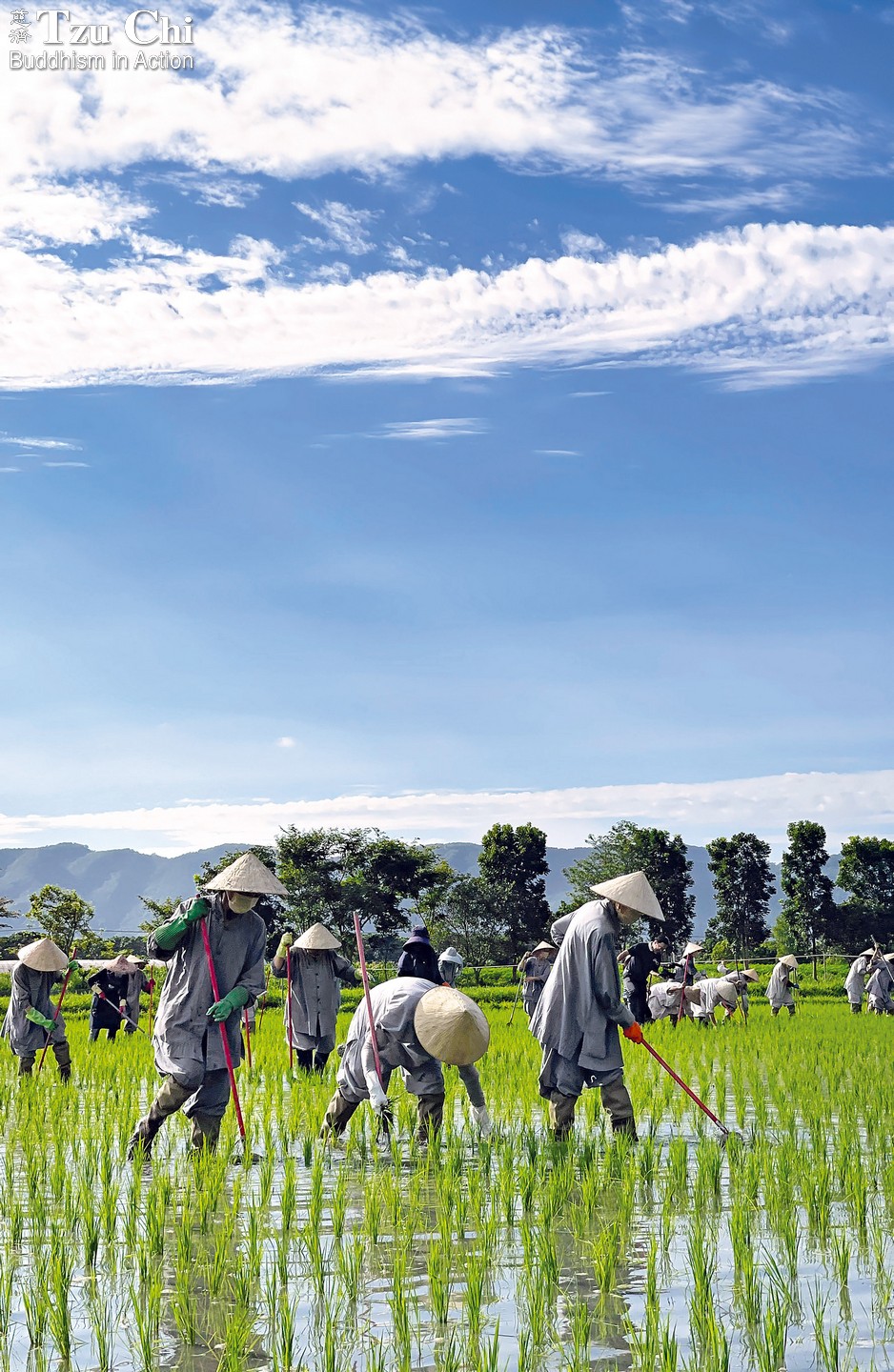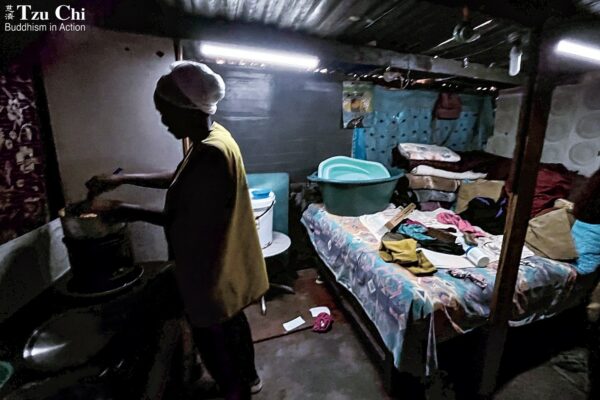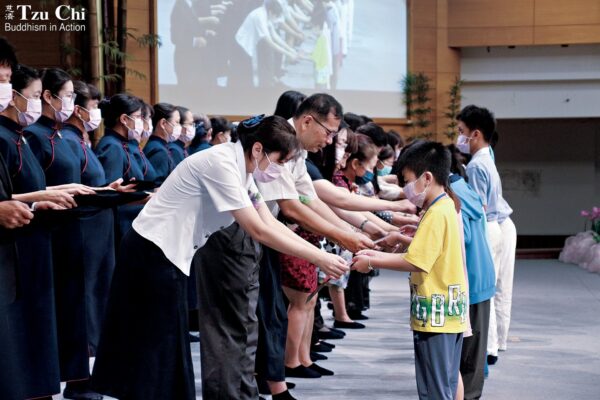By Dharma Master Shi De Zao
Edited and translated by Wu Hsiao-ting
Photos courtesy of Gan Qing-wen

Photo by Shi De Qian
Zhixue Great Love Farm lies at the foot of Liyu Mountain in Shoufeng Township, Hualien County, eastern Taiwan. The farm serves as the “rice bowl” of the Jing Si Abode, the Buddhist convent founded by Master Cheng Yen and the spiritual home of Tzu Chi volunteers worldwide. Spanning 12 hectares and leased from the Taiwan Sugar Corporation, the farm has been cultivated using eco-friendly practices since 2016, earning organic certification.
The farm helps sustain the dietary needs of over 200 nuns and lay monastics at the Abode, along with the Tzu Chi staff working there and visiting volunteers from around the world. Master De Zhao (德昭), a nun at the Abode, recalled that rice had to be purchased every ten days to supply the Abode before the farm was established. Depending on daily needs, holidays, or special events, between 30 and 50 bags of rice—each weighing 30 kilograms (66 pounds)—were procured in either brown or white varieties.
Master De Heng (德恆), another nun at the Abode, helps oversee the farm. She explained that the farm serves two purposes: meeting the Abode’s daily needs and helping those in need. It also addresses Master Cheng Yen’s concerns about potential food crises, fostering a mindset of preparedness for uncertain times. As the Master often reminds everyone, “It is essential to save for a rainy day.”
Turning wasteland into fertile fields
Transforming the farm into what it is today required significant effort. Volunteers first leveled the land and removed stones to prepare it for cultivation, then tackled the irrigation ditch. Volunteer Gan Qing-wen (甘清文), from Taichung, recalled the challenges he and other volunteers encountered while preparing and cultivating the land. “The waterway was overgrown like a jungle,” Gan said, “and blockages upstream had dried up the water supply.” To resolve this, 28 Taichung volunteers worked together to clear the 420-meter-long (1,378-foot-long) ditch, restoring water flow from the Mugua River to irrigate the farm. The physically demanding task pushed the volunteers, many of whom were no longer young, to their limits, requiring frequent rests. But their hard work paid off—with the water supply restored, the land became well-irrigated. They named the restored waterway “Water Guan Yin” for its resemblance to the Guan Yin Bodhisattva.
Step by step, volunteers transformed the barren fields into fertile farmland. Zeng Tian-bao (曾天寶) and Lai Song-yong (賴松勇), from Pingtung, were the first to contribute to the farm work, handling tasks such as planning, planting, and operating machinery. Kang Tian-de (康天德), a consultant for the farm from Hualien, offered expert advice on planting, weeding, and other essential tasks.
Since its establishment, the farm has relied heavily on volunteer support from across Taiwan. Teams from Pingtung, Taichung, Taoyuan, and Miaoli have assisted with transplanting rice seedlings, weeding, applying organic fertilizers, and maintaining the irrigation ditch. Chiayi volunteer Ye Li-qing (葉麗卿) earned certification to manage administrative tasks for the farm, with assistance from Hualien’s Chen Mu-xiang (陳慕湘). Lai Song-yong and his wife, Qiu Gui-zhu (邱桂珠), have been stationed at the farm for five years, monitoring the fields daily with the help of Tzu Chi employee Wu Shao-min (吳紹民).
Their tireless efforts have earned praise from Master De Heng, while Master De Yu (德愉), another nun overseeing the farm, expressed gratitude: “The volunteers share a common thought—the farm is for the Jing Si Abode, so it must be well cared for. Without their dedication, the farm wouldn’t be what it is today.”
Weeding with heart
About a week after transplanting rice seedlings, it’s time to begin weeding. Master De Heng explained that most farms use conventional farming methods, applying pesticides to eliminate pests and control weeds. However, while pesticides reduce the need for weeding, they also harm the ecosystem. Zhixue Farm practices organic farming, avoiding pesticides and chemical fertilizers to protect life and maintain ecological integrity. Consequently, weeds like barnyard grass, which resembles rice, grow easily and must be removed promptly.
Nuns from the Abode join volunteers in weeding the fields. As they step into the muddy water, it feels as though they’re sinking into a swamp, making it a struggle to lift their feet.
To avoid bending over while weeding, volunteers invented a tool: a long stick with a skimmer at one end to press the barnyard grass into the earth. This method not only removes the weeds, but also helps rice seedlings take root and improves soil aeration, thereby strengthening the seedlings and making them more resilient to wind and rain.
For the past six years, Lu Chun-tao (呂春桃) has invited fellow volunteers from Taoyuan to join the work on the farm in Hualien. The long journey makes every moment on the farm even more precious. They head to the fields at dawn and work until dusk, water bottles strapped to their backs. They walk nearly 20,000 steps each day while weeding. The prolonged use of rain boots causes their toes to turn purple, and in the summer, they sweat so profusely that their eyes become difficult to open. The constant weeding leaves their hands trembling when they hold their bowls at meals, and they often need pain relief ointment to sleep at night.
The volunteers don’t see the backbreaking work as a hardship. Instead, they’re happy to ease the burden of the nuns at the Abode, viewing their work on the farm as a way to form good affinities with the Abode’s residents and Tzu Chi volunteers from around the world. “Being able to form good affinities with our Tzu Chi Dharma family makes the effort worthwhile, no matter how tiring it is,” Lu affirmed.

Photo by Shi De Qian
Hard-earned rice
The farm’s organic methods foster a thriving ecosystem, attracting waterfowl and sparrows. To protect the rice plants from these feathered visitors, volunteers set up barriers around the fields. In 2019, volunteers from Taichung and Taoyuan drove hundreds of steel pipes into the ground to support the bird-deterrent string barriers.
Rice is cultivated twice a year on the farm, with seedlings transplanted to the fields around Lichun (“Start of Spring,” the first solar term of the traditional Chinese lunisolar calendar) and Dashu (“Great Heat,” typically around July 22–23). The protective barriers are installed after each transplanting to shield the young seedlings from being damaged or toppled by waterfowl. “Without these safeguards, our volunteers would have to take shifts from dusk until dawn to chase away the birds,” shared volunteer Lu.
A week after transplanting, the barriers are removed to allow for weeding. When the rice ripens to a golden hue a few months later, the barriers are reinstalled to protect the grains from sparrows.
Despite these precautions, Master De Heng noted the sparrows’ cleverness. They perch on the barriers, using their combined weight to press them down, allowing hundreds or even thousands of their kind to swoop in for a feast. Master De Heng compassionately remarked, “Let them eat, as long as they don’t eat everything.” This sentiment reflects Master Cheng Yen’s teaching to the nuns at the Abode: “What the birds leave behind is ours.”
Every effort, from planting and weeding to setting up safeguards, contributes to the joy of a bountiful harvest. Seeing each grain full and plump fills everyone involved with gratitude.
Visitors to the Abode often praise the delicious rice served there. One volunteer from Indonesia even asked, “Where can we buy this rice? It tastes amazing!” Every grain embodies the care and dedication of those who tend the fields, reminding all that the sweetness of the harvest lies not just in the yield, but in the effort behind it.



